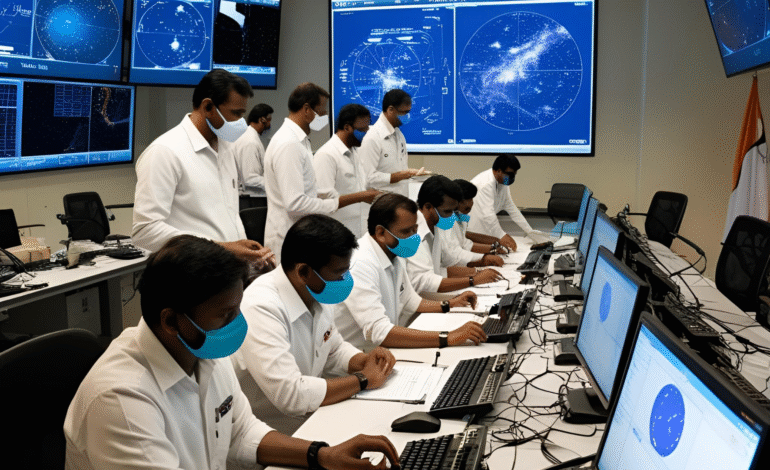India’s Space Future Takes Shape Through Tamil Nadu’s Strategic Policy Launch

In the ever-expanding skies of human ambition, space has become the new frontier for nations to assert innovation, progress, and vision. India, a country whose space journey began humbly with rockets transported on bicycles, now stands on the brink of a new era. At the heart of this transformation lies Tamil Nadu, a southern state brimming with industrial potential, technological acumen, and a forward-looking government. With the approval of its pioneering Space Industrial Policy, Tamil Nadu is not just embracing the cosmos—it’s helping India chart a bold course into the future.
A Southern Spark Igniting National Vision
Space is no longer confined to launchpads and laboratories. It is a vast ecosystem involving satellite technology, data analytics, propulsion systems, manufacturing, and artificial intelligence. Recognizing this, Tamil Nadu’s government has crafted a policy that goes beyond conventional space goals. Under the leadership of Chief Minister MK Stalin and the initiative of State Industries Minister TRB Rajaa, the Tamil Nadu Cabinet recently approved the Space Industrial Policy with three transformative goals—attracting investments of ₹10,000 crore, creating 10,000 high-value jobs, and cultivating a future-ready workforce.
India, as a nation, has been building toward space self-reliance for decades. The Indian Space Research Organisation (ISRO) has performed historic missions like Chandrayaan and Mangalyaan, while fostering global respect. But now, with Tamil Nadu’s entry as a strategic player, the country’s space mission is poised to decentralize, democratize, and scale rapidly.
The Tamil Nadu policy is not a mere document—it is a launchpad for dreams grounded in Earth but aimed at the stars.
Birth of the TN Space Bays: Innovation Zones on Indian Soil
Central to this policy are the soon-to-be-established TN Space Bays—dedicated industrial corridors designed exclusively for space-related activities. These are not abstract zones; they are the seeds of an ecosystem that welcomes startups, multinational corporations, research bodies, and educational institutions alike. Unlike conventional tech parks, these Bays will serve as collaborative hubs for every component of the space value chain—from payloads to propulsion, from satellites to data processing.
Special incentives are key to attracting players across the board. For instance, companies investing in Space Bays will receive wage subsidies: 30% in the first year, 20% in the second, and 10% in the third. Furthermore, to encourage innovation and intellectual property generation, the state will provide a 50% subsidy for patent filings. This strategic balance of financial motivation and technological infrastructure is Tamil Nadu’s way of laying down a runway for India’s new generation of space entrepreneurs.
By weaving together innovation, research, business, and education, the TN Space Bays signal that India is no longer just participating in the space economy—it is architecting it.
Beyond Rockets: A Full-Stack Space Ecosystem
One of the most compelling aspects of Tamil Nadu’s policy is its holistic vision. Minister TRB Rajaa emphasized that the initiative isn’t just about rockets and satellites. It is about building a full-stack space ecosystem—one that encompasses payload development, data analytics, satellite servicing, launch infrastructure, ground support, and downstream space-tech services.
The broader Indian narrative has often been dominated by ISRO’s headline-grabbing launches. However, the new policy underscores an important shift: India’s space future will be shaped as much by private enterprises, startups, and MSMEs as by government agencies. By integrating deep-tech innovation with practical application, Tamil Nadu’s approach resonates with the national aim of becoming a $10 trillion economy by the early 2030s.
In this context, Tamil Nadu’s vision is not just local—it is national in impact, and global in ambition.
Kulasekarapattinam: India’s Second Gateway to the Stars
Tamil Nadu’s strategic role in India’s space journey is further solidified by a landmark development—the construction of India’s second spaceport in Kulasekarapattinam, located in the Thoothukudi district. This facility, spearheaded by ISRO, is designed specifically for the Small Satellite Launch Vehicle (SSLV)—a nimble, cost-effective rocket capable of carrying payloads up to 500 kg.
While Sriharikota in Andhra Pradesh remains India’s primary spaceport, it is optimized for eastward launches toward equatorial orbits. Launching southward from Sriharikota, especially for SSLVs, presents challenges such as the need to curve trajectories to avoid overflying Sri Lanka. This maneuver consumes precious fuel and reduces payload efficiency—issues that are especially detrimental for smaller rockets.
Kulasekarapattinam, located farther south, offers a straight-line path to polar orbits without such overflight risks. With this new launch facility, India will be able to host more frequent, cost-effective launches—especially for commercial and startup-driven missions.
Empowering India’s Human Capital for the Space Age
Every rocket needs thrust, and every policy needs people. The Tamil Nadu Space Policy envisions the creation of at least 10,000 high-value jobs, but this is not just a number—it is a call to arms for India’s engineers, scientists, analysts, and young dreamers.
India has long been known for its STEM talent. Its universities produce thousands of graduates every year, and Indian scientists have contributed to NASA, ESA, and space programs across the globe. Now, Tamil Nadu seeks to turn this global diaspora of talent inward, building capacity at home and creating opportunities that rival those abroad.
By fostering partnerships with research institutions, universities, and vocational academies, the policy ensures that India’s youth are not just spectators to the space revolution but key contributors. Reskilling programs, scholarships, and industrial training in satellite technology, AI, and aerospace engineering will ensure that the workforce is ready to power India’s interstellar dreams.
This isn’t merely about creating jobs—it’s about building careers, industries, and a legacy for future generations.
From State Policy to National Aspiration
Tamil Nadu’s approach is a case study in how regional leadership can drive national transformation. While the state reaps direct economic and industrial benefits, the ripple effects are bound to uplift the entire nation. The synergy between the state’s industrial focus and ISRO’s national missions demonstrates how federal and state bodies can collaborate toward shared goals.
With Tamil Nadu taking a lead, other Indian states may follow suit, potentially creating a constellation of space clusters across India—each specializing in different verticals, from satellite component manufacturing in Gujarat to space-tech analytics in Karnataka, and propulsion research in Maharashtra. Tamil Nadu, by being the first to formalize this ecosystem with infrastructure and incentives, plays the role of a trailblazer.
India’s success in space has always been driven by vision and discipline. With this policy, those traits are now being institutionalized across multiple levels of governance.
Global Stage Awaits a New Indian Star
As space becomes a multi-trillion-dollar industry globally, India is already catching the attention of international stakeholders. The country’s ability to provide cost-effective launch solutions, coupled with a maturing private space sector, positions it as a viable alternative to established players like the US, Russia, and China.
Tamil Nadu’s policy, by inviting both domestic and international companies to invest and innovate, adds another feather to India’s already impressive space cap. Whether it’s satellite communication, weather monitoring, agricultural data, or interplanetary missions—India is proving that it can lead not just with speed, but with substance.
The policy’s clear articulation of downstream innovation—data analytics, GIS services, and satellite servicing—signals that India is not just building rockets; it is building relevance. It is laying down the groundwork for becoming a comprehensive space service provider, not just a launch provider.
A Nation Rising From the Earth, Reaching for the Sky
From the coastal sands of Kulasekarapattinam to the vibrant industrial corridors of Tamil Nadu, India is scripting a powerful narrative of innovation, determination, and vision. The Tamil Nadu Space Industrial Policy is more than just a state initiative—it is a national milestone. It embodies the spirit of modern India: bold in ambition, strategic in execution, and united in purpose.
As India’s space future takes shape through Tamil Nadu’s strategic launch, one truth becomes clear: the sky is no longer the limit—it’s just the beginning.







